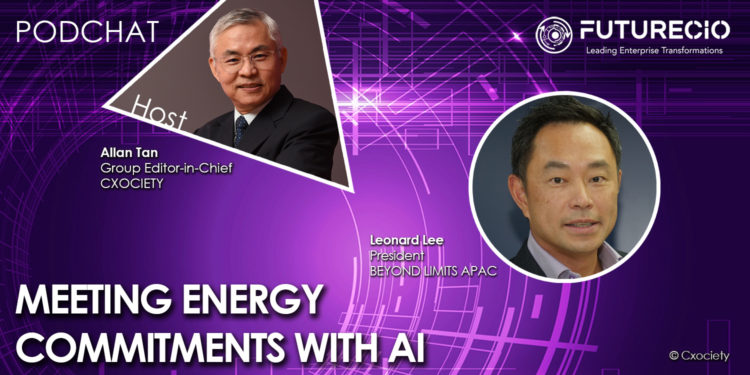* Editor's note: This article is co-produced by Sukhpreet Kaur
The global energy ecosystem is currently undergoing a massive transformation, and in the decades ahead, it will continue to become more decentralised, digitalised, and decarbonised. To reach the commitments made under the 2015 Paris Agreement – limiting the global temperature rise to well below 2°C – this transition must accelerate.
In recent years, the energy sector has become increasingly digital. It is clear that further digitalisation will be a key feature of the energy transition and an essential driver of the sector’s progress towards ambitious climate goals.

Leonard Lee, president of Beyond Limits for Asia-Pacific, acknowledged that the oil & gas (energy) sector faces several hurdles – technical, operational, and regulatory – in the operation of the business.
He cited one of the key challenges is attracting talent, particularly compared to big tech companies. The other is around retaining the domain knowledge of the senior employees that are retiring soon. Then there is the mounting pressure to switch to more environmentally friendly energy products.
“For a 105-year-old oil company, switching to green hydrogen in the matter of a couple of years is a huge business model transformation."
Leonard Lee
“Other industries are early adopters of artificial intelligence (AI) smart manufacturing and other technologies. This is no easy task for the oil and gas industry. It goes from change management, the mindset of executives and you must educate them on what AI can do to improve their operations, reduce operating costs, and increase profitability,” he explained.
Where does your organisation sit or where do you think AI sits in the two models of businesses?
Leonard Lee: AI helps the current fossil fuel, oil, and gas industry to be more efficient. It plays a major part in optimising the production plan or known as the linear plan, to maximise product output with the lowest carbon emissions during the refining process.
The energy companies are now looking into investing in green hydrogen which is rather new to the industry and AI is the only software that optimises across different systems and produces the outcome intended.
From the point of view of Beyond Limits as an organisation, what differentiates you from other potential competitors within your space?
Leonard Lee: Our CTO, Mark L. James, was the head of AI for NASA Mars Rover program's first version so our heritage in the technology comes from there. The whole AI algorithm, which the industry calls cognitive AI, was first built for the program. It picks up data from sensors and then combines human and expert knowledge into the algorithm which is very difficult to do.
Speaking of cognitive AI, from my understanding, there are three types of AI: narrow AI, general AI, and then superintelligence AI. Where does cognitive AI fit into this space?
Leonard Lee: There are three levels of AI. First, you have machine learning and that is the most basic form. Then there is hybrid AI and cognitive AI and lastly, at the highest level, artificial general intelligence (AGI). This is supposed to be exactly like a human being, able to process contextual awareness with data and make human-like decisions.
How do you see cognitive AI, as providing a differentiator for the energy sector, regardless of whether it is the traditional energy companies or those that are doing green energy if you could narrow down this part of the world to our region, Asia?
Leonard Lee: All of our solutions are built on the cognitive AI algorithm and we are bringing it to the oil companies in the region, whether it is Southeast Asia, China, Indonesia or Thailand. To manage a large-scale operation, you need countless sensors. Cognitive AI basically codifies decades of operating knowledge and combines that with all the data from the senses to produce the best recommendation in terms of decision making.
Can AI or machine learning provide sufficient advisory services even though in each of the smaller markets, things are done differently?
Leonard Lee: If the refinery or the asset is owned by one of the super majors, they typically deploy the same technology that they would use in the US or in Europe. The older assets built 50-60 years ago, however, had no such thing as digital technology. It is a decision that has to be made in conjunction with the government to see whether it is worth trying to digitise or replace the old assets.
Let's talk about the business side of this. For business leaders in the energy sector, how do they go about assessing whether AI makes business sense for them? What factors do I look for in making the decision?
Leonard Lee: There is no simple solution for something like that. The pricing difference between one province and another is more of the commercial contract signed years ago with the typical energy consumption pattern. With the use of AI, specifically for the grid, suppliers maintain the grid at a certain availability so it plays a part in the value chain. (question not really answered)
Given the many priorities of the energy sector, how do the energy sector leaders prioritise their investment strategies?
Leonard Lee: The clearest priority right now is ESG and green renewables. This can be at the country or global level which then translates into corporations and businesses who also have their own targets or goals. We have many investments into carbon reduction and net zero these days so if a company does not have a green strategy, that is an issue.
Click on the PodChat player and listen to Lee discuss in detail the challenges and opportunities to the energy sector given the new conditions impacting the ecosystem.
- What are some challenges that the oil and gas (energy) sector faces today regarding digitalisation?
- How do these challenges affect efforts by the energy sector to carbon reduction targets and possibly be more sustainable?
- What is Cognitive AI? Where does it fit in the different types of AI – narrow AI, general AI and superintelligence AI?
- How can Cognitive AI be a differentiator for the energy sector, be it traditional or green energy within the Southeast Asia region?
- How can AI improve operational efficiencies across the energy industry, especially for Southeast Asian companies that are new or undergoing rapid transformation while trying to tackle critical concerns such as sustainability?
- How active can AI play this crucial role in the energy sector to achieve sustainability goals?
- For business leaders in the energy sector, how do they go about assessing whether AI makes business sense for them?
- Given the many priorities of the energy sector, including carbon targets, alternative energy development, cybersecurity and even transformation, and against the backdrop of rising energy costs, how do the energy sector leaders prioritise their investment strategies?




